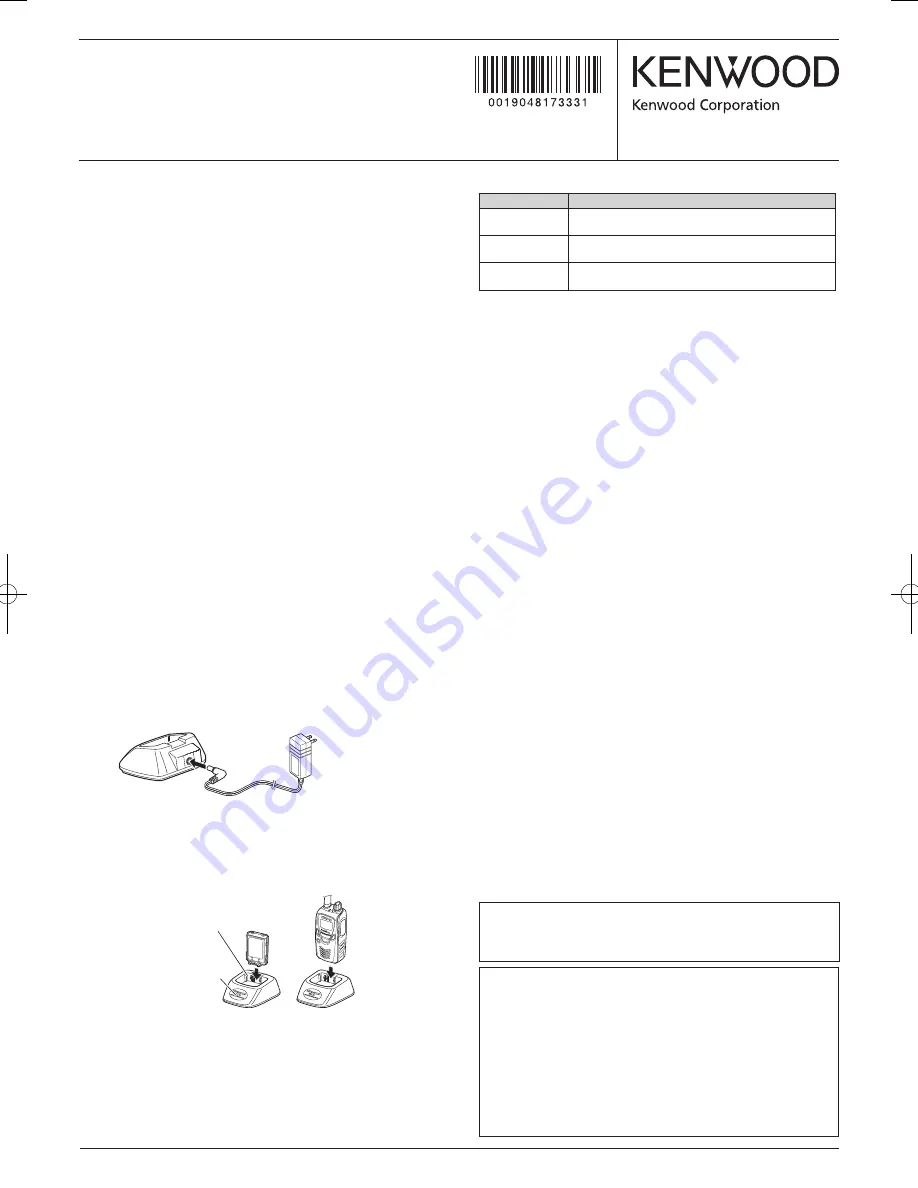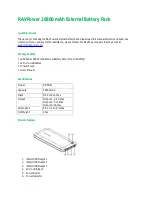
KSC-37
RAPID CHARGER
INSTRUCTION MANUAL
© B62-2222-00 (K)
Thank you for purchasing this charger. This product will offer years of
reliable service when used to charge the specified battery packs.
SUPPLIED EQUIPMENT
Charger (W08-1095-XX) ................................................................... 1
AC adapter (W08-1203-XX) .............................................................. 1
Instruction manual (B62-2222-XX) ................................................... 1
APPLICABLE BATTERY PACK
Charge only the battery pack listed below. Other types of batteries
may burst, causing personal injury.
KNB-46L
(3.7 V)
CHARGING TIPS
• Using the transceiver while charging its battery pack will interfere
with correct charging.
• If the operating time of a battery pack decreases although the
battery pack is fully and correctly charged, the battery pack life is
over. Replace the battery pack.
• The ambient temperature should be from 41°F (5°C) to 104°F (40°C)
while charging is in progress.
• The charging times provided are obtained when a battery pack
discharged to 3 V/cell x 1 is charged at normal temperatures. This
charging time varies depending on the degree of discharge and the
ambient charging temperature.
• This charger may be suitable to charge battery packs not listed
herein, due to further technology development.
• If the battery pack contacts are not properly mated with the charger
terminals, the indicator may blink red or may remain unlit. To resolve
this problem, reinsert the battery pack after cleaning the battery
pack contacts and the charger terminals.
• When using this equipment near a radio or television, you may
experience interference with reception.
CHARGING PROCEDURE
WARNING: Do not use in explosive atmosphere (gases, dust,
fumes, etc.).
ATTENTION:
Always switch OFF a transceiver equipped with a battery
pack before inserting the transceiver into the charger.
1
Plug the AC adapter cable into the jack located on the rear of the
charger.
To AC outlet
2
Plug the AC adapter into an AC outlet.
3
Slide a battery pack or a transceiver equipped with a battery pack
into the charging slot.
• Make sure the metal contacts of the battery pack mate securely
with the charger terminals.
• The indicator lights red and charging starts.
Charging slot
Indicator
4
When charging is completed, the indicator lights green. Remove
the battery pack or the transceiver from the charging slot.
• When the charger will not be used for a long time, unplug the AC
adapter from the AC outlet.
Approximate Charging Times
3 hours
Charger Status Table
Indicator color
Meaning
Red
A battery pack is in the charging slot and charging has
started.
Blinking Red
The battery pack is defective or the battery pack contacts
are not properly mated with those of the charger.
Green
Charging is completed; remove the battery pack or the
transceiver from the charging slot.
SAFETY PRECAUTIONS
Please read all safety instructions before using this charger. For best
results, be aware of all warnings on the charger, the battery pack, and
the product using the battery pack.
• Do not disassemble the charger. Incorrect reassembly can cause
fire or electric shock.
• Use of an attachment not recommended by nor sold by
Kenwood
can cause fire, electric shock, or injury.
• Do not expose the charger to rain or moisture, to avoid the risk of
fire or electric shock.
• Always remove the AC adapter from a wall outlet before attempting
to inspect or clean the charger. Removing the battery packs or
changing the controls does not remove the AC voltage from the
charger.
• Position the AC adapter cable so it will not be stepped on, tripped
over, nor subjected to damage.
• Always remove the AC adapter from an AC wall outlet by pulling on
the adapter rather than the cable.
• Do not use the charger if it has a damaged AC adapter or adapter
cable, or if the charger has been damaged in any way. Contact your
Kenwood
dealer to replace or repair the damaged part.
• Prevent strong impacts, such as caused by dropping, since the
charger can be damaged.
• Do not use the charger in hot or humid environments, in direct
sunlight, nor near heaters.
• Do not use solvents such as benzene or paint thinner to clean the
charger.
• Use only the supplied AC adapter.
• The socket-outlet shall be near the equipment and shall be easily
accessible.
• Do not install this equipment in a confined space such as a book
case or similar unit.
• Attention should be drawn to the environmental aspects of battery
disposal.
SPECIFICATIONS
AC Voltages: 100 - 240 V
Dimensions (W x H x D)/ Weight <charger only>:
3.4 x 1.7 x 4 inches/ Approx. 0.2 Ibs
(86.3 x 43.2 x 100.0 mm/ Approx. 100 g)
ATTENTION:
Check the rating label attached to the bottom of the
charger for other important specifications.
One or more of the following statements may be applicable to this
equipment.
FCC WARNING
This equipment generates or uses radio frequency energy. Changes or modifications to
this equipment may cause harmful interference unless the modifications are expressly
approved in the instruction manual. The user could lose the authority to operate this
equipment if an unauthorized change or modification is made.
INFORMATION TO THE DIGITAL DEVICE USER REQUIRED BY THE FCC
This equipment has been tested and found to comply with the limits for a Class B digital
device, pursuant to Part 15 of the FCC Rules. These limits are designed to provide
reasonable protection against harmful interference in a residential installation.
This equipment generates, uses and can generate radio frequency energy and, if not
installed and used in accordance with the instructions, may cause harmful interference
to radio communications. However, there is no guarantee that the interference will not
occur in a particular installation. If this equipment does cause harmful interference to
radio or television reception, which can be determined by turning the equipment off and
on, the user is encouraged to try to correct the interference by one or more of the following
measures:
• Reorient or relocate the receiving antenna.
• Increase the separation between the equipment and receiver.
• Connect the equipment to an outlet on a circuit different from that to which the receiver
is connected.
• Consult the dealer for technical assistance.




















